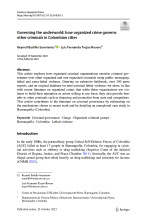By Reynell Badillo-Sarmiento & Luis Fernando Trejos-Rosero
This article explores how organized criminal organizations exercise criminal governance over other organized and non-organized criminals using public messaging, lethal and extra-lethal violence. Drawing on extensive fieldwork, over 350 press reports, and an original database on inter-criminal lethal violence, we show, in line with recent literature on organized crime, that while these organizations use violence to build their reputation as actors willing to use force, they also provide benefits to other criminals such as financing and protection from state and competitors. This article contributes to the literature on criminal governance by elaborating on the mechanisms shown in recent work and by detailing an unexplored case study in Barranquilla (Colombia).
Colombia: Trends in Organized Crime, 2023. 27p.



